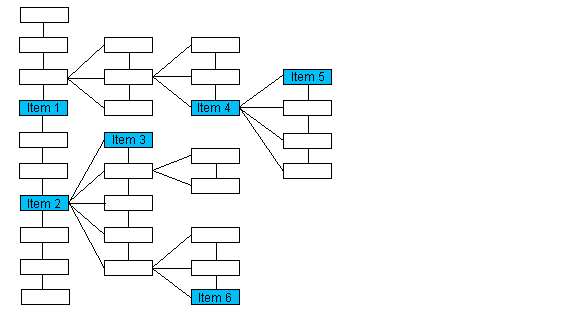
|
Available in LEADTOOLS Medical Imaging toolkits. |
#include "Ltdic.h"
L_LTDIC_API pDICOMIOD L_DicomGetChildIOD(pIOD)
|
pDICOMIOD pIOD; |
/* pointer to a DICOMIOD structure */ |
Returns a pointer to the item in the IOD Structure that contains the first child of the specified item.
|
Parameter |
Description |
|
pIOD |
Pointer to a DICOMIOD structure that contains an item in the IOD Structure. |
Returns
|
!NULL |
A pointer to a DICOMIOD structure that contains the item in the IOD Structure that is the first child of the item specified in pIOD. |
|
NULL |
pIOD has no child items. |
Comments
This function requires that the IOD Structure is evaluated as a tree structure.
The child is the offspring one level lower than the specified item. If the specified item has no child items, this function will return NULL. For example:

|
If the passed pointer points to : |
The function returns a pointer to : |
|
Item 1 |
NULL |
|
Item 2 |
Item 3 |
|
Item 4 |
Item 5 |
|
Item 6 |
NULL |
The following functions will also help you navigate the IOD Structure:
Required DLLs and Libraries
|
LTDIC For a listing of the exact DLLs and Libraries needed, based on the toolkit version, refer to Files To Be Included With Your Application |
Win32, x64
See Also
Example
This example displays in a tree control the tree of the IOD table
#include <commctrl.h>
L_VOID ShowTree(HWND hDlg, HTREEITEM hParentItem, pDICOMIOD pParentIOD)
{
TV_INSERTSTRUCT tvInsert;
TV_ITEM tvItem;
HTREEITEM hItem;
pDICOMIOD pIOD;
if (pParentIOD == NULL)
pIOD = L_DicomGetFirstIOD(pParentIOD, TRUE);
else
pIOD = L_DicomGetChildIOD(pParentIOD);
while (pIOD != NULL)
{
tvItem.mask = TVIF_TEXT;
tvItem.pszText = pIOD->pszName;
tvInsert.hParent = hParentItem;
tvInsert.hInsertAfter = TVI_LAST;
tvInsert.item = tvItem;
hItem = (HTREEITEM)SendMessage(hDlg, TVM_INSERTITEM, (WPARAM)0,
(LPARAM)(LPTV_INSERTSTRUCT)&tvInsert);
if (L_DicomGetChildIOD(pIOD) != NULL)
ShowTree(hDlg, hItem, pIOD);
pIOD = L_DicomGetNextIOD(pIOD, TRUE);
}
}
L_INT DicomGetChildIODExample(HWND hDlg)
{
ShowTree(hDlg, TVI_ROOT, NULL);
return DICOM_SUCCESS;
}